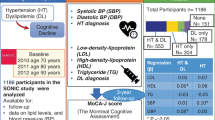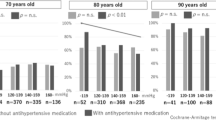Abstract
Cognitive function tends to decline with age, and individuals with mild cognitive impairment (MCI) often have difficulty completing established self-management tasks. The aim of this study was to investigate the association between the number of days within a 5-and-a-half-day period that patients took their home blood pressure (BP) as instructed and MCI assessed by the Japanese version of the Montreal Cognitive Assessment (MoCA-J) in an elderly clinical population. We analyzed 303 ambulatory patients (mean age 77.3 ± 8.2 years) in whom MoCA-J had been assessed, who were instructed to take home BP for 1 evening and twice a day for the next five days, and who had at least one morning home BP measurement. After accounting for patient characteristics including age, sex, body mass index, drinking, smoking, prevalent cardiovascular disease, morning systolic BP and diastolic BP, and the use of antihypertensive drugs, the number of days home BP was measured was independently associated with both total MoCA-J score (estimate, 0.82; 95% confidence interval [CI], 0.43–1.21; P < 0.001) and the lowest quartile of MoCA-J score (13 or below) (odds ratio [OR], 0.72; 95%CI, 0.59–0.87; P = 0.001). Home BP measurement noncompliance (<5 days’ measurement) was also independently associated with the total MoCA-J score (estimate, −2.56; 95%CI, −4.09 to −1.03; P = 0.001) and the lowest quartile of MoCA-J score (OR, 3.32; 95%CI, 1.59–6.96; P = 0.001). In conclusion, poor compliance with home BP monitoring was associated with cognitive impairment in elderly cases who had been specifically instructed to perform home BP monitoring during a designated period.

This is a preview of subscription content, access via your institution
Access options
Subscribe to this journal
Receive 12 print issues and online access
$259.00 per year
only $21.58 per issue
Buy this article
- Purchase on Springer Link
- Instant access to full article PDF
Prices may be subject to local taxes which are calculated during checkout


Similar content being viewed by others
References
Umemura S, Arima H, Arima S, Asayama K, Dohi Y, Hirooka Y, et al. The Japanese society of hypertension guidelines for the management of hypertension (JSH 2019). Hypertens Res. 2019;42:1235–481.
Mancia Chairperson G, Kreutz Co-Chair R, Brunström M, Burnier M, Grassi G, Januszewicz A, et al. 2023 ESH guidelines for the management of arterial hypertension the task force for the management of arterial hypertension of the european society of hypertension endorsed by the european renal association (ERA) and the International society of hypertension (ISH). J Hypertens. 2023. https://doi.org/10.1097/HJH.0000000000003480
Hoshide S, Yano Y, Haimoto H, Yamagiwa K, Uchiba K, Nagasaka S, et al. Morning and evening home blood pressure and risks of incident stroke and coronary artery disease in the Japanese general practice population: the Japan morning surge-home blood pressure study. Hypertension. 2016;68:54–61.
Sivén SS, Niiranen TJ, Langén VL, Puukka PJ, Kantola IM, Jula AM. Home versus office blood pressure: longitudinal relations with left ventricular hypertrophy: the Finn-Home study. J Hypertens. 2017;35:266–71.
Kawauchi D, Hoshide S, Kario K. Morning home blood pressure and cardiovascular events in a Japanese general practice population over 80 years old: the J-HOP study. Am J Hypertens. 2018;31:1190–6.
Aparicio LS, Thijs L, Boggia J, Jacobs L, Barochiner J, Odili AN, et al. Defining thresholds for home blood pressure monitoring in octogenarians. Hypertension. 2015;66:865–73.
Cheng FY, Chang Y, Cheng SJ, Shaw JS, Lee CY, Chen PH. Do cognitive performance and physical function differ between individuals with motoric cognitive risk syndrome and those with mild cognitive impairment? BMC Geriatri. 2021;21:36.
Santos T, Lovell J, Shiell K, Johnson M, Ibrahim JE. The impact of cognitive impairment in dementia on self-care domains in diabetes: a systematic search and narrative review. Diabetes/Metab Res Rev. 2018;34:e3013.
Nishizawa M, Fujiwara T, Hoshide S, Sato K, Okawara Y, Tomitani N, et al. Winter morning surge in blood pressure after the Great East Japan Earthquake. J Clin Hypertens. 2019;21:208–16.
Nishizawa M, Hoshide S, Okawara Y, Matsuo T, Kario K. Strict blood pressure control achieved using an ICT-based home blood pressure monitoring system in a catastrophically damaged area after a disaster. J Clin Hypertens. 2017;19:26–9.
Fujiwara Y, Suzuki H, Yasunaga M, Sugiyama M, Ijuin M, Sakuma N, et al. Brief screening tool for mild cognitive impairment in older Japanese: validation of the Japanese version of the Montreal cognitive assessment. Geriat Gerontol Int. 2010;10:225–32.
Wong A, Xiong YY, Kwan PW, Chan AY, Lam WW, Wang K, et al. The validity, reliability and clinical utility of the Hong Kong Montreal Cognitive Assessment (HK-MoCA) in patients with cerebral small vessel disease. Dement Geriatr Cogn Disord. 2009;28:81–7.
Ihara M, Okamoto Y, Takahashi R. Suitability of the Montreal cognitive assessment versus the mini-mental state examination in detecting vascular cognitive impairment. J Stroke Cerebrovasc Dis. 2013;22:737–41.
Yan J, Zheng K, Liu A, Cheng W. The impact of cognitive function on the effectiveness and safety of intensive blood pressure control for patients with hypertension: a post-hoc analysis of SPRINT. Front Cardiovasc Med. 2021;8:777250.
D’Agostino RB Sr., Vasan RS, Pencina MJ, Wolf PA, Cobain M, Massaro JM, et al. General cardiovascular risk profile for use in primary care: the Framingham Heart Study. Circulation. 2008;117:743–53.
Shimizu Y, Sawada N, Ihira H, Abe SK, Inoue M, Yasuda N, et al. Alcohol consumption from midlife and risk of disabling dementia in a large population-based cohort study in Japan. Int J Geriatr Psychiatry. 2023;38:e5896.
Sega R, Facchetti R, Bombelli M, Cesana G, Corrao G, Grassi G, et al. Prognostic value of ambulatory and home blood pressures compared with office blood pressure in the general population: follow-up results from the Pressioni Arteriose Monitorate e Loro Associazioni (PAMELA) study. Circulation. 2005;111:1777–83.
Cacciolati C, Tzourio C, Dufouil C, Alpérovitch A, Hanon O. Feasibility of home blood pressure measurement in elderly individuals: cross-sectional analysis of a population-based sample. Am J Hypertens. 2012;25:1279–85.
Jeong SH, Kim HR, Kim J, Kim H, Hong N, Jung JH, et al. Association of dipeptidyl Peptidase-4 Inhibitor use and amyloid burden in patients with diabetes and AD-Related cognitive impairment. Neurology. 2021;97:e1110–22.
Poly TN, Islam MM, Walther BA, Yang HC, Wu CC, Lin MC, et al. Association between use of statin and risk of dementia: a meta-analysis of observational studies. Neuroepidemiology. 2020;54:214–26.
Ihara M, Nishino M, Taguchi A, Yamamoto Y, Hattori Y, Saito S, et al. Cilostazol add-on therapy in patients with mild dementia receiving donepezil: a retrospective study. PloS one. 2014;9:e89516.
Rao VN, Sheridan SL, Tuttle LA, Lin FC, Shimbo D, Diaz KM, et al. The effect of numeracy level on completeness of home blood pressure monitoring. J Clin Hypertens. 2015;17:39–45.
Berkman ND, Sheridan SL, Donahue KE, Halpern DJ, Viera A, Crotty K, et al. Health literacy interventions and outcomes: an updated systematic review. Evid Rep Technol Assess. 2011;199: 1–941.
Nutbeam D, Lloyd JE. Understanding and responding to health literacy as a social determinant of health. Annu Rev Public Health. 2021;42:159–73.
Todorovic N, Jovic-Vranes A, Djikanovic B, Pilipovic-Broceta N, Vasiljevic N, Lucic-Samardzija V, et al. Assessment of health literacy in the adult population registered to family medicine physicians in the Republic of Srpska, Bosnia and Herzegovina. Eur J Gen Pr. 2019;25:32–8.
Oishi E, Ohara T, Sakata S, Fukuhara M, Hata J, Yoshida D, et al. Day-to-day blood pressure variability and risk of dementia in a general Japanese elderly population: the Hisayama study. Circulation. 2017;136:516–25.
Márquez-Contreras E, Martell-Claros N, Gil-Guillén V, de la Figuera-Von Wichmann M, Casado-Martínez JJ, Martin-de Pablos JL, et al. Efficacy of a home blood pressure monitoring programme on therapeutic compliance in hypertension: the EAPACUM-HTA study. J Hypertens. 2006;24:169–75.
Acknowledgements
We particularly thank Nobuhiko Yasui and Shinobu Ozaki of A&D Co. for invaluable contributions to this project.
Funding
This work was supported by JSPS KAKENHI Grant Number JP22K10591.
Author information
Authors and Affiliations
Corresponding author
Ethics declarations
Conflict of interest
KK has received research grants from Omron Healthcare and A&D Company. The other authors declare no competing interests.
Additional information
Publisher’s note Springer Nature remains neutral with regard to jurisdictional claims in published maps and institutional affiliations.
Supplementary information
Rights and permissions
Springer Nature or its licensor (e.g. a society or other partner) holds exclusive rights to this article under a publishing agreement with the author(s) or other rightsholder(s); author self-archiving of the accepted manuscript version of this article is solely governed by the terms of such publishing agreement and applicable law.
About this article
Cite this article
Hoshide, S., Nishizawa, M., Kanegae, H. et al. Home blood pressure measurement consistency and cognitive impairment. Hypertens Res 47, 177–183 (2024). https://doi.org/10.1038/s41440-023-01436-2
Received:
Revised:
Accepted:
Published:
Issue Date:
DOI: https://doi.org/10.1038/s41440-023-01436-2
Keywords
This article is cited by
-
Home blood pressure measurement of hypertensive patients with cognitive impairment—Is it “environmental pressure”?
Hypertension Research (2024)
-
The importance of regular home blood pressure monitoring over the life course
Hypertension Research (2024)



